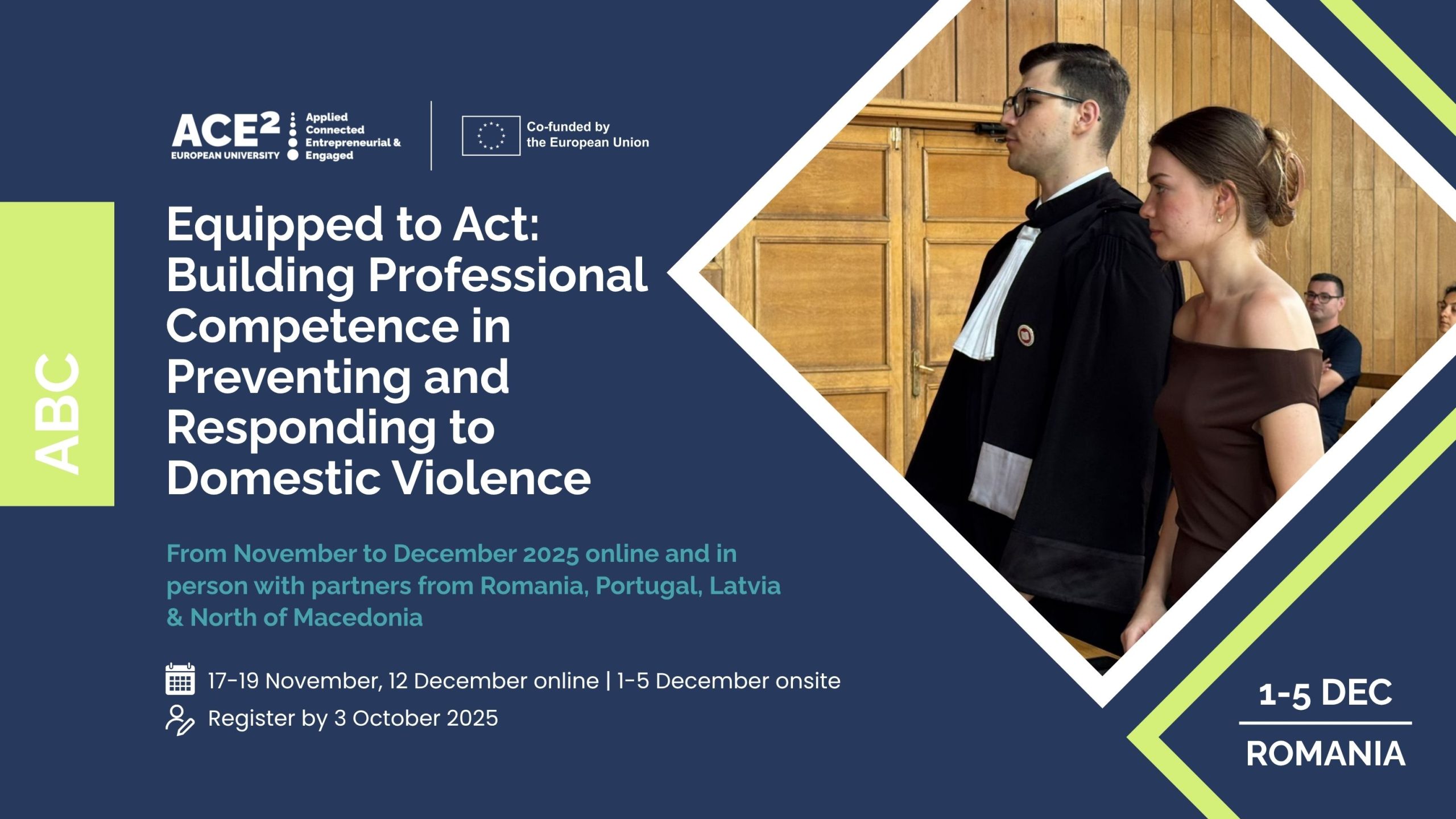

Course Title: Equipped to Act: Building Professional Competence in Preventing and Responding to Domestic Violence!
Course Type: Applied Blended Challenge (ABC) Program
These credit-bearing blended programmes use a challenge-based approach and include at least one mobility week for students from all ACE2-EU members.
They are delivered jointly by ACE2-EU universities and external stakeholders from industry, society, or government.
Their main goal is for students to work together on solutions to real-world challenges related to EU priorities such as the digital and green transitions and current socio-economic issues.
Duration and Timeline:
10 hrs. synchronous online, 25 hrs. onsite + 55 hrs. independent and group work
Award, Credits and Certification
On successful completion of the course participants will receive 3 ECTS credits and a certificate of attendance
Organized by:
Constantin Brancusi University(Romania) …Lead and Host Institution
Corina Drăgan (UCB)
Monica-Delia Bîcă (UCB)
Cristian – Adrian Miron (UCB)
Goce Delcev University(North of Macedonia)
Elena Maksimova (UGD)
Olga Koshevaliska (UGD)
Daniela Koceva(UGD)
Santarem Polytechnic University (Portugal)
Perpetua Silva (IPSantarem)
Maria Potes Barbas (IPSantarem)
Latvian Academy of Culture(Latvia)
Katrīna Dūka (LAC)
Sintija Skrabe (LAC)
External stakeholders that will be involved in the course:
Course Description and Learning Objectives
“To prepare future professionals to effectively prevent and respond to domestic violence by developing their understanding, critical awareness, and practical competencies through real-life community challenges and interdisciplinary collaboration. “
Course Description:
This interdisciplinary course aims to equip students with the professional knowledge, skills, and attitudes required to prevent and respond effectively to domestic violence. Based on real challenges from the local community in Târgu Jiu (Romania), the course combines theoretical input with practical experiences, allowing students to interact directly with professionals working in law enforcement, social services, education, justice, and civil society.
Participants will explore the complexity of domestic violence through a multidisciplinary lens, including legal, psychological, social, cultural and ethical dimensions. They will engage in interactive sessions, case analyses, simulations, and field visits, and will collaborate on concrete proposals for improving prevention and intervention mechanisms. The course is designed for students preparing for careers in social work, education, psychology, law, healthcare, culture and related fields.
At the end of the program, students will be required to develop a team-based research project in their home universities, focusing on a topic directly linked to the course: children left without parental protection as a result of domestic violence-related crimes. The research outcomes will be compiled and published as a collective volume and may serve as the foundation for future European-funded project proposals. Students will also be encouraged to present their work at conferences organized within the Alliance or other academic settings.
Specific learning objectives include:
Increasing students’ awareness of the multiple forms, causes, and consequences of domestic violence across different socio-cultural contexts.
Developing interdisciplinary professional skills for identifying, preventing, and responding to domestic violence, with a focus on collaboration between social, legal, educational, and healthcare services.
Familiarizing students with institutional frameworks and support mechanisms, including legal instruments and intervention protocols at national and European levels.
Enhancing students’ empathy and communication abilities when working with victims, their families, and other stakeholders.
Encouraging critical reflection on ethical, cultural, and gender-based dimensions of domestic violence, and their impact on professional practice.
Applying acquired knowledge and skills through practical activities based on real-life challenges from the local community (e.g., case studies, simulations, field visits, stakeholder interactions).
By the end of the course, students will be able to:
Which students would find this course useful for them?
This course may be suitable for students from ACE2-EU partner universities enrolled in undergraduate or postgraduate programs in the following fields:
Applications Process:
Interested applicants should 🔗 Apply here: https://forms.gle/gr2jYGqyMhWK1dzr8
Deadline for receipt of applications: 3rd of October 2025, 23:59
A notification of acceptance to participate will be sent to successful applicants on the 10th of October 2025 (an acceptance letter will be sent by the host institution and will include program registration details)
Further Information
For any further information or queries related to the course, please contact:
Ace-com@e-ucb.ro.